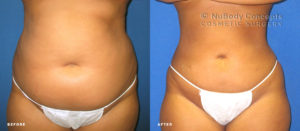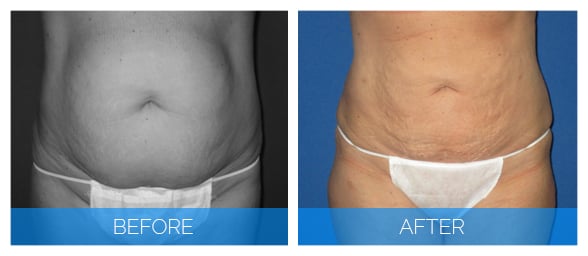
Medically reviewed by Dr. John Rosdeutscher – Written by Sine Thieme
Who Is a Good Candidate for Liposuction?
Very broadly speaking, a good candidate for liposuction is within 30% of his or her ideal weight, in good general medical condition, and doesn’t smoke. The procedure is a great option for women and men who may have recently lost weight and maintain a healthy lifestyle but are struggling to rid themselves of pockets of stubborn fat. It is a popular often for belly fat removal – but also the back, bra rolls, love handles, thighs, upper arms, and neck.
There are several factors a plastic surgeon needs to take into account before taking you on as a patient for fat removal with liposuction. Below, our staff at NuBody Concepts Cosmetic Surgery in Nashville and Memphis, TN, has prepared an closer look at each of these factors to help you determine if you qualify for liposuction for your fat reduction.
Your BMI Should Be Under 30
It is important to have realistic expectations when considering liposuction. Many people don’t understand that liposuction is not a cure for obesity, nor a weight loss program. In fact, some of the best candidates for liposuction are already close to their target weight but have annoying pockets of excess fat resistant to diet and exercise. If you are substantially above your target weight, you are not a good candidate for liposuction. You will have to lose weight before body contouring with liposuction can be effective.
Start with your Body Mass Index (BMI). Even though it’s not a perfect measurement, your BMI is an important factor taken into consideration. It is a simple calculation using your weight and height to determine the decision to operate.
To make it easier for you to get a good idea if liposuction is for you, we have created a BMI calculator. Go ahead and calculate your BMI, then use the following guidelines:
| BMI < 30 | BMI 30-35 | BMI > 35 |
|---|---|---|
| Ideal candidate for liposuction; add on Skin Tightening for even better results. | May qualify, but may see better results with a tummy tuck. | Not an ideal candidate; advised to reduce BMI by enrolling in a weight loss program such as the Orbera weight-loss balloon. |
You Should Be Close to Your Target Weight
Again, weight is not the only indicator, but rather your weight as proportion of your height. The higher the BMI, the higher the risk of complications from surgery. For instance, studies have found that patients with a BMI greater than 40 are over 3 times more susceptible for complications than patients of normal weight. Interestingly, you are not home free on the other end of the spectrum either. Patients who are too thin with not enough “give” in their skin are at higher risk of having irregularities and indentations after liposuction. A BMI below 20 may put you in that group.
Having said all this, please know that to really determine your fitness for plastic surgery, our board certified plastic surgeon needs to see you in a personal consultation.
Keep the Fat Removal Volume Under 5,000 cc
The American Society of Plastic Surgeons recommends that no more than 5,000 cc (5 liters) of fat and fluid are removed in a liposuction procedure. Similarly to procedures for high-BMI patients, the complication rates for so-called high volume liposuctions are too high. Even though this is not written into law, most plastic surgeons will adhere to the guidelines set by the ASPS.
Such recommendations are based on in-depth studies of post-operative liposuction patients and should be taken seriously, even if your particular state or plastic surgeon allows for a higher limit.
If you have a lot of excess fat, your plastic surgeon may ask you to get closer to your target weight before having liposuction. Programs like the Orbera Gastric Balloon may help you achieve this faster and with more success than diet and exercise alone.
You Are Medically Cleared for Surgery
Most surgeons will classify candidates by their general health to determine the risk posed by plastic surgery. Candidates for liposuction who consider themselves otherwise healthy may still have an underlying condition that disqualifies them. Your doctor will go over these in your consultation and may recommend a physical examination from your primary physician before cosmetic surgery. Conditions like asthma, diabetes, and high blood pressure are typical warning flags for plastic surgeons.
Expect to be asked to disclose whether you’re a smoker, or whether you’ve stopped smoking less than 6 weeks before your procedure. Smokers (or users of tobacco or nicotine products) have a greater risk of infection, significant surgical complications like delayed healing, additional scarring, or skin death, and potential issues with recovery from anesthesia such as coughing, increased bleeding, venous thrombosis, pulmonary embolism, potentially other life-threatening lung or heart issues.
You will also have to disclose if you take any kind of heart medication, especially blood thinners, as these can have serious effects on your ability to heal after surgery. You’ll typically need to supply a letter from your cardiologist clearing you for elective surgery and stating that it’s safe for you to stop your blood thinners a certain number of days pre-op.
You Have Good Skin Elasticity
Removing fat deposits is only one part of making your abdomen (or thighs, or arms) look tight and smooth again. The other part is making sure that your skin shrinks back to the newly reduced surface area.
If your skin doesn’t shrink back, the results will not be great. It will look akin to a deflated balloon. If your goal is to show some skin after your procedure, you will want to ensure smooth and even skin.

If you are young and have not undergone any pregnancies, your chances of elastic skin that springs right back to its shape are much higher. Conversely, giving birth and/or aging take a toll on skin elasticity. If you have cellulite, liposuction alone will also leave you with unsatisfactory results. And lastly, if you have a history of keloid scarring, your are at higher than average risk of developing them after liposuction. It’s definitely something you should discuss with your surgeon prior to the procedure.
The good news is that sagging and cellulite-like skin can be improved with non-surgical skin tightening added on. It is a body contouring procedure that when combined with liposuction achieves results previously only seen with surgical procedures like tummy tucks, thigh lifts, and arm lifts. It uses radio frequency assisted lipolysis (RFAL) to apply controlled heat to underlying tissue and tighten the skin.

Your Fat is Subcutaneous and Not Visceral
There are two different types of belly fat: Visceral Fat, also referred to as intra-abdominal fat, and subcutaneous or extra-abdominal fat.
Visceral fat is located deep behind the abdominal wall around the organs – stomach, intestines, and liver. This means it’s behind the muscles that make up a more or less-developed six-pack, behind our core. The bad news is that visceral fat cannot be removed via liposuction. It is simply lodged too deep inside. And what’s worse, it’s also the kind of fat that can become dangerous to our health. High levels of visceral fat are a prime contributor to high blood pressure, diabetes, and heart disease. It is more common in men – older men in particular – and often referred to as “pot belly” or “beer belly.” But women can develop it too, particularly after menopause when estrogen levels drop.
Subcutaneous fat is stored directly beneath our skin. It is the unsightly flab you’re often left with after rigorous exercise and dieting, no matter how hard you try. People with such subcutaneous fat are excellent candidates for liposuction. Even though it doesn’t negatively affect our health, it is nonetheless annoying to most people. Whether around your belly in terms of a “muffin top,” around your thighs as “saddle bags,” or in form of a bra bulge or “male breasts,” subcutaneous fat deposits are easy to target with a combination of liposuction techniques.
How to tell the difference? Visceral fat is typically very firm to touch. If a patient doesn’t want to come in for a consultation, we ask him or her over the phone if it feels firm. A good way to determine if you have visceral fat is to stand up straight and see how much of the “bulge” you can actually grab a hold of. If you can’t easily pinch it, it’s likely visceral. If it’s flabbier and easy to pinch, it’s likely subcutaneous fat that will respond well to liposuction.
Timing Considerations for Your Liposuction
We require that patients considering liposuction are at least 18 years old. Other than that, there is no right or wrong age for liposuction for patients who have a healthy lifestyle, within a safe BMI range, and are medically cleared for surgery.
One question that often crops up is whether you can have liposuction if you want to have more children. The answer is yes. Liposuction does not interfere with your ability to go through pregnancy and childbirth. Also, the fat that was removed with liposuction will not come back when you become pregnant – although your body can accumulate new fat cells in those and other areas.
Nevertheless, liposuction is well suited to remove fat left over from previous pregnancies, especially when coupled with skin tightening. If. you’ve had one or more children and are unhappy with the “mommy belly,” it couldn’t be a better time for liposuction.
We hope that we’ve given you a better understanding about liposuction candidates. Please don’t hesitate to contact us if you have any other questions.
If you are ready to get started, use the pink button to schedule a consultation with our board-certified plastic surgeon in Nashville or Memphis.












